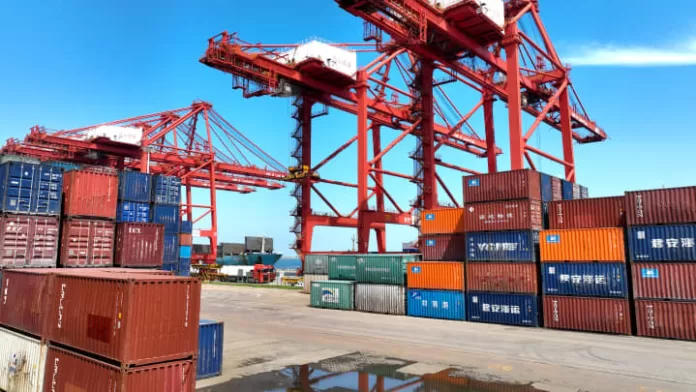Nigeria, as Africa’s largest economy, heavily relies on imported products to meet the demands of its population and industries. Despite its wealth, the country continues to grapple with a high rate of importation, particularly for commodities that could be produced locally. In 2023, the dynamics of Nigeria’s import landscape reveal a complex interplay of economic factors, including a significantly weakened naira against the US dollar, which has made foreign goods increasingly expensive for Nigerian buyers.
According to the National Bureau of Statistics, refined petroleum oils, armored vehicles, cars, and wheat topped the list of Nigeria’s most valuable imports, collectively accounting for over half of the nation’s total import value. The total value of imports stood at N12.47 trillion, accounting for 39.11% of the country’s merchandise trade.
The Nigeria import trade has a 10.71% decrease from the N13.97 trillion recorded in Q1 2024 but still showed a 97.93% increase from the N6.30 trillion recorded in Q2 2023. The data highlights a significant reliance on foreign products, with a staggering 76.3% of imports sourced from just ten countries, predominantly in Asia and Europe. As we delve into the top five goods Nigeria imports the most, we’ll explore not only the numbers but also the underlying implications for the economy and local industries
Top 5 Imported Products in Nigeria
Ordinary Motor Spirit
Ordinary motor spirit, commonly known as petrol, stands as Nigeria’s most imported product, underscoring a significant paradox in the country’s economic landscape. In the first quarter of 2023, imports surged from N2.63 trillion to N3.22 trillion by the second quarter of 2024, marking a 22.34% increase. This rise emphasizes the country’s heavy reliance on refined petroleum products, despite Nigeria being an oil-rich nation.
Refined petroleum products represent the largest category of imports in Nigeria, with petrol alone accounting for 25.83% of the global motor spirit imports into the country. This dependency is primarily due to Nigeria’s insufficient refining capacity, which fails to meet domestic fuel demand. As a result, products like diesel and kerosene also contribute significantly to import statistics, placing a considerable strain on the economy.
The continued rise in petrol imports reflects a pressing need for enhanced local refining capabilities to reduce reliance on international markets and bolster Nigeria’s economic resilience.
READ ALSO: The Rising Cost of Education in Nigeria: A Crisis for Families and Society in 2024
Gas Oil
Gas oil, commonly known as diesel, plays a critical role in Nigeria’s economy, particularly for transportation and powering industrial machinery. In 2021, Nigeria imported approximately 5.2 million metric tons of diesel, highlighting the nation’s continued reliance on imported fuel despite its status as an oil-producing country. Limited refining capacity has necessitated these substantial imports to meet both industrial and transportation demands.
In Q1 2023, the import value of gas oil stood at N1.20 trillion, but by Q2 2024, it plummeted to N688.87 billion, reflecting a significant 42.41% decrease. During this period, gas oil accounted for 5.52% of Nigeria’s total imports.
A key factor in this decline was the commencement of operations at the Dangote refinery in March 2023, which began supplying diesel and aviation jet fuel in April. This influx of locally refined products contributed to a drop in diesel prices across the country, signaling a potential shift towards greater self-sufficiency in fuel production.
Durum Wheat
Durum wheat is essential for producing flour, bread, and pasta, making it a critical component of Nigeria’s food supply. In 2021, Nigeria imported approximately 2.5 million metric tons of wheat, with durum wheat accounting for a substantial portion. The rising demand for wheat products, driven by changing dietary preferences and a growing population, has solidified its status as one of Nigeria’s key imports.
However, recent data indicates a notable decline in durum wheat imports. The import value decreased from N519.75 billion in Q1 2023 to N414.69 billion in Q2 2024, reflecting a 21.17% drop. Despite this decrease, wheat imports still represented a significant part of Nigeria’s total food import bill, highlighting the ongoing reliance on international markets for this essential commodity.

The country imports 98 percent of its wheat needs and the grain is the third most imported goods in 2023, accounting for four percent of total imports, mainly purchased from the United States, Latvia, Canada, Russia and Lithuania. Latvia, Russia and Lithuania are countries known for producing poor-quality wheat. Notably, the popularity of wheat remains strong among Nigerian consumers, particularly as prices for close substitutes like garri and rice continue to rise.
3. Cane Sugar
Nigeria’s sugar consumption currently ranges from 1.4 to 1.6 million metric tons, with a staggering 96% of this quantity imported as raw sugar, primarily from Brazil. This imported sugar is then refined in the country’s three major refineries: Dangote, BUA, and Golden Penny.
Recent data from the National Sugar Development Council (NSDC) highlights a dramatic rise in sugar prices, with the average price increasing by 103% year-on-year in the first quarter of 2024.
Specifically, the average cost surged to N16.76 million per metric ton, up from N8.24 million in the same period of 2023. This steep escalation in sugar prices underscores the challenges Nigeria faces in achieving self-sufficiency in sugar production and the reliance on imports to meet domestic demand.
The domestic sugar industry has struggled to meet demand due to infrastructural and production challenges. Consequently, sugar remains one of the most imported agricultural products.
4. Used Vehicles
Used vehicles are highly sought after in Nigeria, with about 200,000 units imported annually. The affordability of used cars compared to new vehicles, coupled with the country’s growing middle class, makes this category significant. Most imports come from countries like the United States and Japan, with a notable preference for large diesel-engine vehicles.
The value of these imports saw a dramatic increase, rising from N93.91 billion in Q1 2023 to N130.84 billion in Q2 2024—an impressive 39.27% jump. However, this reliance on imported vehicles poses challenges for Nigeria, straining the foreign exchange market and limiting local job creation, as highlighted by the National Automotive Design and Development Council (NADDC
In conclusion, Nigeria’s import activities have far-reaching economic impacts, influencing inflation rates, employment levels, and overall economic stability. Addressing these issues through enhanced manufacturing capabilities, infrastructural development, and investment in agriculture is crucial for achieving sustainable economic growth. By focusing on these key sectors, Nigeria can reduce its reliance on imports and foster a more resilient economy.

